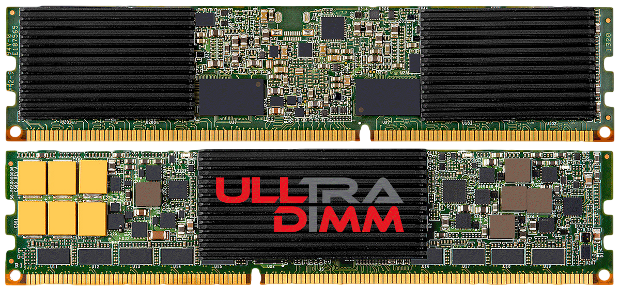SanDisk Corporation, a world-leading producer of flash storage devices, has been delivered a preliminary injunction against the continued sale of their current version of UlltraDIMM memory channel storage devices in the United States. These UlltraDIMMs were produced in partnership with Diablo Technologies, who provides the memory controller ICs utilized in their production. The issue at heart is the fact that Diablo is using memory interface technology that had been patented by Netlist, another producer of memory modules, without Netlist’s approval or licensing.
 The preliminary injunction was ordered by Judge Yvonne Gonzalez Rogers of the U.S. District Court for the Northern District of California. The judge also moved up the trial date by some four months to March 9, 2015, signaling that she felt there was a strong chance that Netlist would prevail at trial, barring a settlement prior to the court date. The judge also rejected SanDisk’s motion that it should be allowed to sell its existing inventory, finding that since SanDisk has a long-term contract with Diablo for the production of UlltraDIMMs, that it was proper that they be included under the injuction. Legal observers indicate that the issuing of such a preliminary injunction is liable to accelerate SanDisk’s desire to negotiate an out-of-court settlement.
The preliminary injunction was ordered by Judge Yvonne Gonzalez Rogers of the U.S. District Court for the Northern District of California. The judge also moved up the trial date by some four months to March 9, 2015, signaling that she felt there was a strong chance that Netlist would prevail at trial, barring a settlement prior to the court date. The judge also rejected SanDisk’s motion that it should be allowed to sell its existing inventory, finding that since SanDisk has a long-term contract with Diablo for the production of UlltraDIMMs, that it was proper that they be included under the injuction. Legal observers indicate that the issuing of such a preliminary injunction is liable to accelerate SanDisk’s desire to negotiate an out-of-court settlement.
 Netlist stated that it had created and patented memory interface technology, and that it had contracted with Diablo to implement it into a controller chipset. Netlist subsequently discovered that Diablo was using the same technology in its own products, and thus had harmed Netlist’s ability to sell its own NVvault and HyperVault products. Diablo’s stated defense to date is that it was entitled to use the information that was supplied by Netlist.
Netlist stated that it had created and patented memory interface technology, and that it had contracted with Diablo to implement it into a controller chipset. Netlist subsequently discovered that Diablo was using the same technology in its own products, and thus had harmed Netlist’s ability to sell its own NVvault and HyperVault products. Diablo’s stated defense to date is that it was entitled to use the information that was supplied by Netlist.
 Netlist indicated that as a result of the preliminary injunction Diablo and SanDisk are prohibited from producing and selling the controller chipset used by SanDisk in the UlltraDIMM SSD, and as a result, from further sale or distribution of the UlltraDIMM itself. The court also identified IBM’s eXFlash memory modules as infringing, and hence also banned. OEM’s such as Huawei, Supermicro and Lenovo had plans to offer ULLtraDIMM equivalents, and these plans are now on hold pending resolution of the dispute.
Netlist indicated that as a result of the preliminary injunction Diablo and SanDisk are prohibited from producing and selling the controller chipset used by SanDisk in the UlltraDIMM SSD, and as a result, from further sale or distribution of the UlltraDIMM itself. The court also identified IBM’s eXFlash memory modules as infringing, and hence also banned. OEM’s such as Huawei, Supermicro and Lenovo had plans to offer ULLtraDIMM equivalents, and these plans are now on hold pending resolution of the dispute.
 According to C.K. Hong, CEO of Netlist, “The ruling serves as a major step towards establishing the rightful ownership of the intellectual property contained in the ULLtraDIMM, and clears the path for Netlist products based on our proprietary memory interface technology. We look forward to the opportunity to present all of the evidence to a jury, particularly given the court’s assessment of our likelihood of prevailing.”
According to C.K. Hong, CEO of Netlist, “The ruling serves as a major step towards establishing the rightful ownership of the intellectual property contained in the ULLtraDIMM, and clears the path for Netlist products based on our proprietary memory interface technology. We look forward to the opportunity to present all of the evidence to a jury, particularly given the court’s assessment of our likelihood of prevailing.”
 We have also reached out to both Diablo and SanDisk for comment, but have received no reply as of this article’s posting. We will update this post as soon as any reply is received from either. Do not be surprised to see a very quick resolution to this, possibly even including an “acquisition”. Stay tuned!
We have also reached out to both Diablo and SanDisk for comment, but have received no reply as of this article’s posting. We will update this post as soon as any reply is received from either. Do not be surprised to see a very quick resolution to this, possibly even including an “acquisition”. Stay tuned!
 The SSD Review The Worlds Dedicated SSD Education and Review Resource |
The SSD Review The Worlds Dedicated SSD Education and Review Resource | 